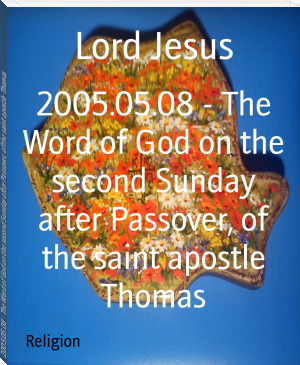The Story of a Soul - Saint Thérèse de Lisieux (best color ereader .TXT) 📗

- Author: Saint Thérèse de Lisieux
- Performer: -
Book online «The Story of a Soul - Saint Thérèse de Lisieux (best color ereader .TXT) 📗». Author Saint Thérèse de Lisieux
No doubt, dear Mother, you will think I exaggerate somewhat the night of my soul. If you judge by the poems I have composed this year, it must seem as though I have been flooded with consolations, like a child for whom the veil of Faith is almost rent asunder. And yet it is not a veil—it is a wall which rises to the very heavens and shuts out the starry sky.
When I sing of the happiness of Heaven and the eternal possession of God, I do not feel any joy therein, for I sing only of what I wish to believe. Sometimes, I confess, a little ray of sunshine illumines my dark night, and I enjoy peace for an instant, but later, the remembrance of this ray of light, instead of consoling me, makes the blackness thicker still.
And yet never have I felt so deeply how sweet and merciful is the Lord. He did not send me this heavy cross when it might have discouraged me, but at a time when I was able to bear it. Now it simply takes from me all natural satisfaction I might feel in my longing for Heaven.
Dear Mother, it seems to me that at present there is nothing to impede my upward flight, for I have no longer any desire save to love Him till I die. I am free; I fear nothing now, not even what I dreaded more than anything else, a long illness which would make me a burden to the Community. Should it please the Good God, I am quite content to have my bodily and mental sufferings prolonged for years. I do not fear a long life; I do not shrink from the struggle. The Lord is the rock upon which I stand—"Who teacheth my hands to fight, and my fingers to war. He is my Protector and I have hoped in Him."[14] I have never asked God to let me die young, It is true I have always thought I should do so, but it is a favour I have not tried to obtain.
Our Lord is often content with the wish to do something for His Glory, and you know the immensity of my desires. You know also that Jesus has offered me more than one bitter chalice through my dearly loved sisters. The holy King David was right when he sang: "Behold how good and how pleasant it is for brethren to dwell together in unity."[15] But such unity can only exist upon earth in the midst of sacrifice. It was not in order to be with my sisters that I came to this holy Carmel; on the contrary, I knew well that in curbing my natural affection I should have much to suffer.
How can it be said that it is more perfect to separate oneself from home and friends? Has anyone ever reproached brothers who fight side by side, or together win the martyr's palm? It is true, no doubt, they encourage each other; but it is also true that the martyrdom of each is a martyrdom to them all.
And so it is in the religious life; theologians call it a martyrdom. A heart given to God loses nothing of its natural affection—on the contrary, this affection grows stronger by becoming purer and more spiritual. It is with this love, dear Mother, that I love you and my sisters. I am glad to fight beside you for the glory of the King of Heaven, but I am ready to go to another battlefield, did the Divine Commander but express a wish. An order would not be necessary: a simple look, a sign, would suffice.
Ever since I came to the Carmel I have thought that if Our Lord did not take me quickly to Heaven, my lot would be that of Noe's dove, and that one day he would open the window of the Ark and bid me fly to heathen lands, bearing the olive branch. This thought has helped me to soar above all created things.
Knowing that even in the Carmel there must be partings, I tried to make my abode in Heaven; and I accepted not only exile in the midst of an unknown people, but what was far more bitter, I accepted exile for my sisters. And indeed, two of them were asked for by the Carmel of Saïgon, our own foundation. For a time there was serious question of their being sent, and I would not say a word to hold them back, though my heart ached at the thought of the trials awaiting them. Now all that is at an end; the superiors were absolutely opposed to their departure, and I only touched the cup with my lips long enough to taste of its bitterness.
Let me tell you, dear Mother, why, if Our Lady cures me, I wish to respond to the call from our Mothers of Hanoï. It appears that to live in foreign Carmels, a very special vocation is needed, and many souls think they are called without being so in reality. You have told me that I have this vocation, and that my health alone stands in the way. But if I am destined one day to leave this Carmel, it will not be without a pang. My heart is naturally sensitive, and because this is a cause of much suffering, I wish to offer Jesus whatsoever it can bear. Here, I am loved by you and all the Sisters, and this love is very sweet to me, and I dream of a convent where I should be unknown, where I should taste the bitterness of exile. I know only too well how useless I am, and so it is not for the sake of the services I might render to the Carmel of Hanoï that I would leave all that is dearest to me—my sole reason would be to do God's Will, and sacrifice myself for Him.
And I should not suffer any disappointment, for when we expect nothing but suffering, then the least joy is a surprise; and later on suffering itself becomes the greatest of all joys, when we seek it as a precious treasure.
But I know I shall never recover from this sickness, and yet I am at peace. For years I have not belonged to myself, I have surrendered myself wholly to Jesus, and He is free to do with me whatsoever He pleases. He has spoken to me of exile, and has asked me if I would consent to drink of that chalice. At once I essayed to grasp it, but He, withdrawing His Hand, showed me that my consent was all He desired.
O my God! from how much disquiet do we free ourselves by the vow of obedience! Happy is the simple religious. Her one guide being the will of her superiors, she is ever sure of following the right path, and has no fear of being mistaken, even when it seems that her superiors are making a mistake. But if she ceases to consult the unerring compass, then at once her soul goes astray in barren wastes, where the waters of grace quickly fail. Dear Mother, you are the compass Jesus has given me to direct me safely to the Eternal Shore. I find it most sweet to fix my eyes upon you, and then do the Will of my Lord. By allowing me to suffer these temptations against Faith, He has greatly increased the spirit of Faith, which makes me see Him living in your soul, and through you communicating His holy commands.
I am well aware that you lighten the burden of obedience for me, but deep in my heart I feel that my attitude would not change, nor would my filial affection grow less, were you to treat me with severity: and this because I should still see the Will of God manifesting itself in another way for the greater good of my soul.
Among the numberless graces that I have received this year, not the least is an understanding of how far-reaching is the precept of charity. I had never before fathomed these words of Our Lord: "The second commandment is like to the first: Thou shalt love thy neighbour as thyself."[16] I had set myself above all to love God, and it was in loving Him that I discovered the hidden meaning of these other words: "It is not those who say, Lord, Lord! who enter into the Kingdom of Heaven, but he who does the Will of My Father."[17]
Jesus revealed me this Will when at the Last Supper He gave His New Commandment in telling His Apostles to love one another as He had loved them.[18] I set myself to find out how He had loved His Apostles; and I saw that it was not for their natural qualities, for they were ignorant men, full of earthly ideas. And yet He calls them His Friends, His Brethren; He desires to see them near Him in the Kingdom of His Father, and in order to admit them to this Kingdom He wills to die on the Cross, saying: "Greater love than this no man hath, that a man lay down his life for his friends."[19]
As I meditated on these Divine words, I saw how imperfect was the love I bore my Sisters in religion. I understood that I did not love them as Our Lord loves them. I know now that true charity consists in bearing all our neighbours' defects—not being surprised at their weakness, but edified at their smallest virtues. Above all I know that charity must not remain shut up in the heart, for "No man lighteth a candle, and putteth it in a hidden place, nor under a bushel; but upon a candlestick, that they who come in may see the light."[20]
It seems to me, dear Mother, this candle represents that charity which enlightens and gladdens, not only those who are dear to us, but all those who are of the household.
In the Old Law, when God told His people to love their neighbour as themselves, He had not yet come down upon earth; and knowing full well how man loves himself, He could not ask anything greater. But when Our Lord gave His Apostles a New Commandment—"His own commandment"[21]—He was not content with saying: "Thou shalt love thy neighbour as thyself," but would have them love even as He had loved, and as He will love till the end of time.
O my Jesus! Thou does never ask what is impossible; Thou knowest better than I, how frail and imperfect I am, and Thou knowest that I shall never love my Sisters as Thou hast loved them, unless within me Thou lovest them, dear Lord! It is because Thou dost desire to grant me this grace that Thou hast given a New Commandment. Oh how I love it, since I am assured thereby that it is Thy Will to love in me all those Thou dost bid me love!
Yes, I know when I show charity to others, it is simply Jesus acting in me, and the more closely I am united to Him, the more dearly I love my Sisters. If I wish to increase this love in my heart, and the devil tries to bring before me the defects of a Sister, I hasten to look for her virtues, her good motives; I call to mind that though I may have seen her fall once, no doubt she has gained many victories over herself, which in her humility she conceals. It is even possible that what seems to me a fault, may very likely, on account of her good intention, be an act of virtue. I have no difficulty in persuading





Comments (0)